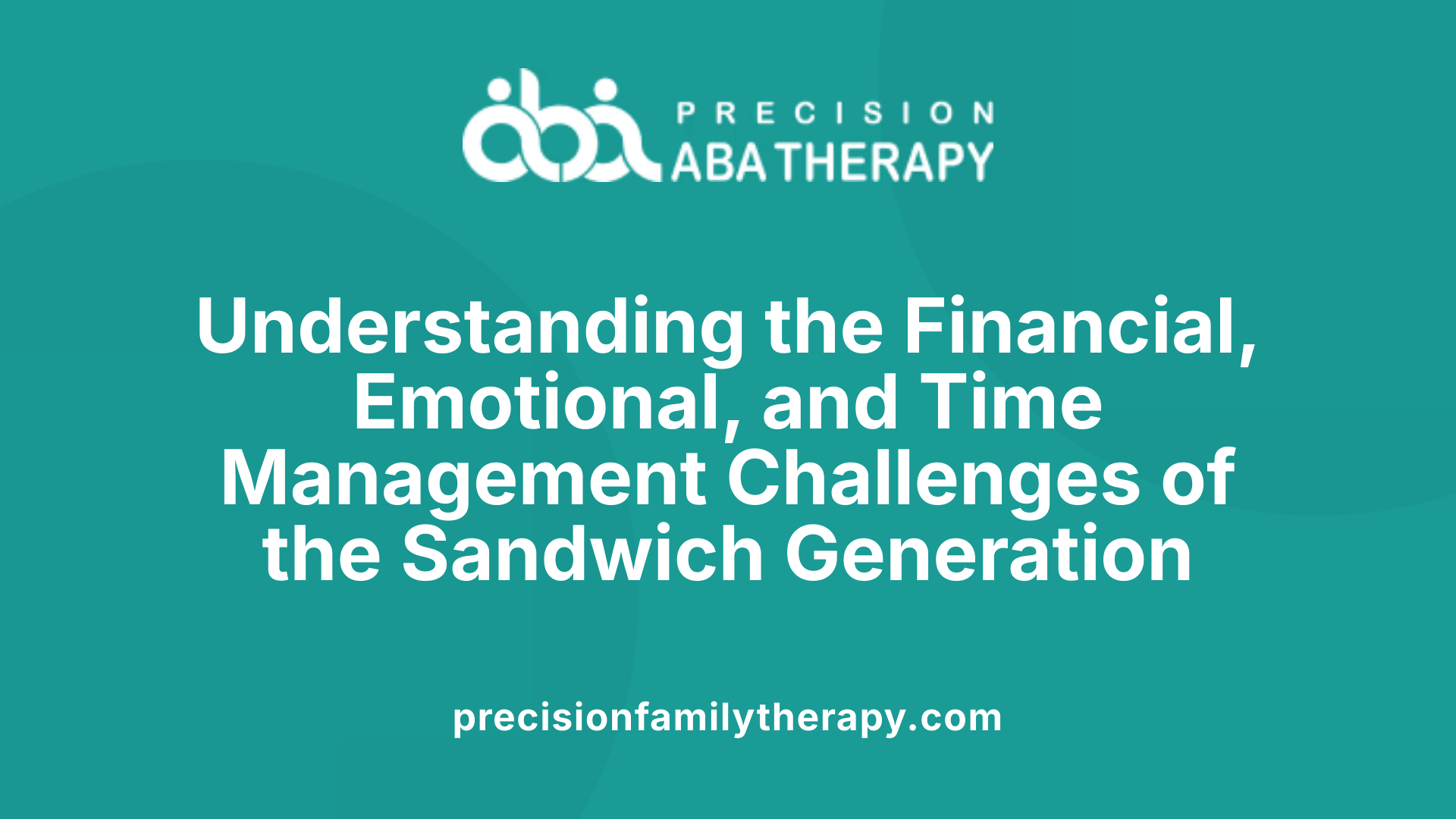Understanding the Dual Burden of Caregiving
The sandwich generation comprises middle-aged adults juggling the dual responsibilities of caring for aging parents and supporting their own children. This complex role brings a unique set of challenges—financial, emotional, physical, and logistical—that can significantly impact their well-being. Recognizing these hardships is the first step in crafting effective support mechanisms through therapy and community resources.
Main Challenges Faced by the Sandwich Generation

What are the main challenges faced by the sandwich generation?
Members of the sandwich generation often find themselves caught between caring for aging parents and supporting their own children. This dual responsibility presents several significant challenges.
Financial difficulties are one of the most pressing concerns. Caregivers typically face high healthcare costs for their parents and educational expenses for their children. Studies indicate that 36% of sandwich caregivers struggle financially, a much higher rate compared to those caring only for older adults. They often need to allocate substantial funds for medical bills, long-term care, and daily needs, which can cause stress, insecurity, and long-term financial strain.
Emotional stress is another critical issue. The burden of caregiving can lead to feelings of guilt, resentment, and emotional exhaustion. Many caregivers report higher levels of distress and anxiety, feeling overwhelmed by their responsibilities. The emotional toll is compounded by family dynamics, cultural expectations, and the constant balancing act needed to meet everyone's needs.
Time management issues are prevalent among caregivers. Many provide 20-30 hours of care per week, on top of full or part-time work. Juggling responsibilities such as scheduling appointments, transportation, household chores, and emotional support leaves little personal time. This often results in neglect of self-care, sleep disturbances, and social isolation.
Caregiver burnout is a widespread risk, stemming from sustained physical, emotional, and mental exhaustion. Burnout can manifest as depression, anxiety, and physical ailments. About 66% of caregivers report negative effects on their employment, with some reducing work hours or pausing careers to manage their duties.
Achieving a work-life balance is a frequent struggle. Caregivers report difficulty maintaining their professional responsibilities while fulfilling family duties. Many have to negotiate flexible work arrangements or take leave, which can impact career development and income.
Addressing these challenges requires strategic planning, such as seeking support from family, community resources, and professional services. Implementing effective time management, prioritizing self-care, and exploring financial aid programs are vital steps in alleviating the pressures faced by this demographic.
| Challenge | Description | Impact |
|---|---|---|
| Financial strains | High costs for healthcare, education, and daily expenses | Stress, insecurity, long-term debt |
| Emotional stress | Feelings of guilt, resentment, emotional exhaustion | Anxiety, depression, burnout |
| Time management | Balancing caregiving, work, and personal life | Fatigue, neglect of self, social isolation |
| Burnout | Chronic physical and emotional exhaustion | Health deterioration, mental health issues |
| Work-life balance | Struggling to meet employment and family demands | Reduced work hours, job insecurity, emotional strain |
Understanding these challenges highlights the importance of comprehensive support strategies for caregivers, including community resources, mental health services, financial planning, and fostering open family communication.
The Role of Therapy and Social Support in Caregiving

What role do therapy and social support play in helping members of the sandwich generation?
For caregivers navigating the challenges of supporting both aging parents and children, therapy and social support are invaluable tools. They provide emotional relief by creating safe spaces where caregivers can share their experiences, vent frustrations, and gain perspective. Support groups, counseling, and community programs foster a sense of belonging, reduce feelings of isolation, and help manage complex family and emotional dynamics.
Coping strategies learned through therapy can include stress management techniques, improving communication skills, and setting healthy boundaries. These strategies enable caregivers to better handle the emotional exhaustion, guilt, and anxiety that often accompany their responsibilities.
Moreover, social services can offer practical help such as connecting caregivers with community resources, respite care options, and educational materials. This behind-the-scenes support can ease workload and provide time for self-care, which is vital for mental health.
Support systems often extend to policy-level initiatives like flexible work arrangements and financial aid programs. These broader support mechanisms are designed to create a more sustainable caregiving environment, reducing stress and financial burden.
Overall, therapy and social support are integral to maintaining mental well-being and ensuring caregivers can provide quality care over the long term. They address both emotional and practical needs, helping caregivers manage their dual roles with resilience and confidence.
Effective Coping Strategies to Prevent Burnout

What are effective coping strategies for managing caregiving responsibilities and preventing burnout?
Caring for both aging parents and children can be overwhelming. To prevent burnout, caregivers need to employ practical strategies that support their physical, emotional, and mental well-being.
One of the most effective approaches is actively seeking support networks. This includes reaching out to family members, friends, support groups, or community resources. Building a support system can provide practical help and emotional reassurance.
Prioritizing self-care is also crucial. Ensuring adequate sleep, balanced nutrition, regular physical activity, and engaging in hobbies or activities that bring joy can bolster resilience. Taking time for oneself fosters mental clarity and reduces stress.
Time management techniques help caregivers organize their busy schedules. Creating routines and breaking tasks into smaller, manageable steps can lessen feelings of being overwhelmed. Using tools like calendars or apps can aid in staying organized.
Open communication with family, friends, and healthcare professionals is vital. Honest dialogue about needs, boundaries, and expectations helps prevent resentment and misunderstandings.
In addition, incorporating relaxation methods such as meditation, deep breathing, or mindfulness exercises can decrease anxiety. Regular breaks, respite care, or short sabbaticals are important to recharge physically and emotionally.
Acknowledging emotions and seeking professional counseling when needed can alleviate feelings of guilt or frustration. Maintaining social connections beyond caregiving duties supports emotional health.
Implementing these strategies creates a sustainable caregiving environment, enabling caregivers to provide quality support without sacrificing their own well-being.
Resources and Tools Supporting Multi-Generational Caregivers
Supporting caregivers managing multiple generations requires access to various resources and practical tools. One comprehensive source is the Family Caregiver Toolbox, which offers guidance on caregiving fundamentals, emotional resilience, financial and legal planning, and medical decision-making. These resources help caregivers navigate complex responsibilities efficiently.
Educational programs tailored for caregivers, such as 'Powerful Tools for Caregivers,' teach essential skills in stress management, effective communication, and self-care. These classes are often available both in-person and online, making them accessible regardless of location or schedule.
Specialized guides and informational resources are also available for specific health conditions like Alzheimer's, Parkinson's disease, or mental health issues. These provide insights into managing symptoms, medication schedules, and legal considerations such as advanced directives or guardianship.
Practical tools to streamline caregiving activities include medication management apps, appointment checklists, and legal document templates. These assist caregivers in organizing medical histories, scheduling appointments, and ensuring legal preparedness.
Support networks form a vital part of caregiving. Support groups—both peer-led and professionally facilitated—offer emotional comfort and shared experiences. Community resources, including local caregiver programs, respite care services, and transportation assistance, help relieve some of the burdens.
Furthermore, many resources are available in multiple languages and are offered free of charge, ensuring they are accessible to diverse caregiver populations. Overall, leveraging these tools and support systems can significantly ease the physical, emotional, and logistical challenges faced by multi-generational caregivers.
Family Dynamics and Emotional Toll in Caregiving Roles

How do family dynamics and emotional toll affect members of the sandwich generation?
Family relationships play a significant role in shaping the emotional experience of those in the sandwich generation. As caregivers juggle the needs of both their aging parents and their children, tensions and conflicts are common. Differences in expectations, cultural backgrounds, and family roles can lead to misunderstandings and resentment.
Unmet expectations or uneven distribution of caregiving duties often cause frustration and guilt, adding to emotional stress. For example, some siblings might not contribute equally, or certain family members may have differing opinions on care decisions. These conflicts can overwhelm caregivers, leading to feelings of inadequacy and emotional exhaustion.
Open and honest communication within families is vital for reducing misunderstandings. Conflict resolution strategies—such as family meetings, mediation, and setting clear boundaries—are effective tools for promoting cooperation.
Support networks, including extended family, friends, community groups, and professionals, can provide emotional relief and practical assistance. These resources help caregivers feel less isolated and more supported.
The emotional toll extends beyond conflicts. Caregivers often face fatigue, behavioral challenges from care recipients, and the pressure of managing multiple roles. This combination can lead to mental health issues such as depression and anxiety.
Maintaining healthy family interactions and leveraging support networks are essential in alleviating the emotional burdens faced by the sandwich generation, enabling them to better manage their responsibilities while preserving their well-being.
Educational and Policy Perspectives on the Sandwich Generation

Why is education and awareness about the stresses faced by the sandwich generation important?
Understanding the unique challenges of the sandwich generation is vital for fostering effective support systems. Education helps caregivers recognize signs of burnout, emotional distress, and financial strain, enabling them to seek help early.
Raising public awareness can cultivate empathy from workplaces, communities, and policymakers, encouraging the development of targeted resources. When society is informed, it becomes easier to advocate for policies that offer financial aid, flexible work arrangements, and accessible health and social services.
Policy implications are significant. Governments can introduce or expand programs such as caregiver support grants, respite care, and mental health services tailored to the needs of this group. Awareness campaigns can also promote awareness of available benefits like FSA or HSA accounts, Medicaid, and long-term care planning options.
Support initiatives include training sessions, resource centers, and community groups that provide practical advice on managing logistics, financial planning, and emotional resilience.
Research from sources like Pew Research Center shows that approximately 23% of U.S. adults belong to the sandwich generation, highlighting the scale of the issue. Data indicates that these caregivers often provide around 75 hours of care monthly, with increased financial and emotional burdens compared to those caring for only one generation.
In sum, education and policy efforts are crucial to address the complexities faced by the sandwich generation. They empower caregivers with knowledge, reduce stigma, and facilitate structural support that alleviates their heavy responsibilities, promoting healthier and more sustainable caregiving environments.
| Aspect | Details | Additional notes |
|---|---|---|
| Importance of Education | Enhances caregiver well-being, promotes early intervention | Empowers self-awareness and resilience |
| Public Awareness | Cultivates empathy and societal support | Drives policy change and resource allocation |
| Policy Implications | Financial aid programs, supportive services | Legislation for work flexibility, healthcare |
| Support Programs | Respite care, community resources, counseling | Tailored to logistical, emotional, and financial needs |
| Research Insights | 23% of U.S. adults in caregiving roles | Higher overload and financial difficulty compared to single-generation caregivers |
Raising awareness and implementing supportive policies are essential steps toward easing the heavy load carried by all members of the sandwich generation, ensuring they receive the recognition and assistance they need.
Building a Supportive Future for Caregivers
Addressing the multifaceted challenges faced by the sandwich generation requires a comprehensive approach that integrates therapy, community resources, supportive policies, and public awareness. By fostering healthier family dynamics, promoting mental health, and providing practical tools and financial assistance, society can help these caregivers sustain their vital roles without sacrificing their well-being. Encouraging ongoing education, policy reform, and accessible support networks will be essential in creating resilient, informed, and empowered care communities for generations to come.
References
- The Sandwich Generations: Challenges and Tips for Coping
- Squeezed in the Middle: Balancing Act of the Sandwich Generation
- Navigating the challenges of the “Sandwich Generation”
- Social Worker's Guide to Supporting the Sandwich Generation
- Navigating the Challenges of the Sandwich Generation for ...
- Women Navigating the Sandwich Generation - Inside Psychotherapy
- The Sandwich Generation: Coping with Dual Caregiving Roles




